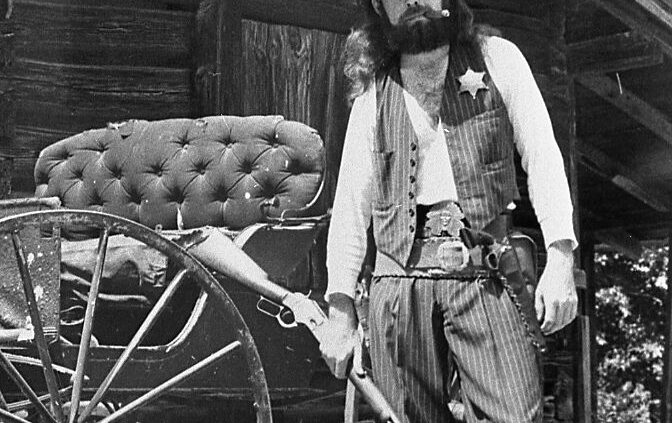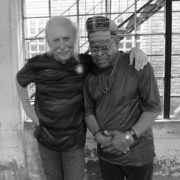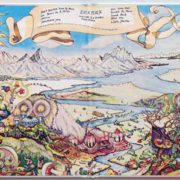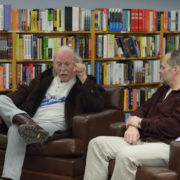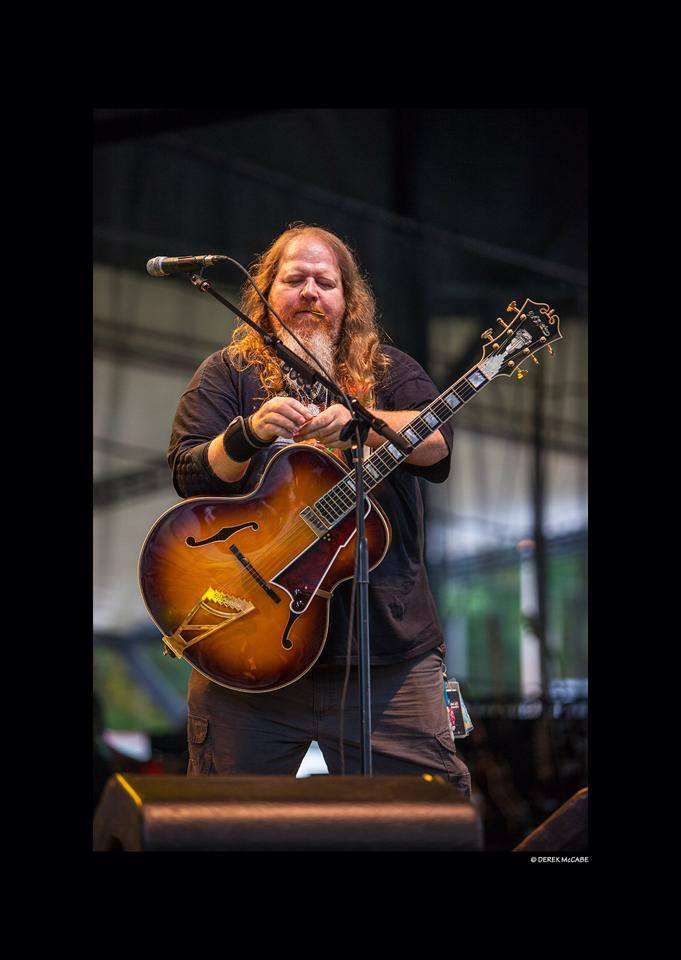Organization Man – Twiggs Lyndon’s wild life and eerie death.
On this day (Nov. 16) in 1979, Twiggs Lyndon died in a skydiving accident in Duanesburg, New York Twiggs was the road manager for the Allman Brothers Band and so much more, including the house photographer who captured so many great early shots of the band. He was a character every bit as interesting and far out as anyone in the band, and I wrote extensively about him in One Way Out.
It was a pleasure to get to know his brothers Skoots, John and AJ in the process. Their cooperation and active participation made OWO a much better book – and allowed me to use to many of Twiggs’ excellent photos. Twiggs is all over OWO, but I present you here, the sidebar I wrote on him. All content copyright Alan Paul, 2014 and excerpted from One Way Out: The Inside History of the Allman Brothers Band.
Organization Man

Twiggs Lyndon self timer
In 1969 when Phil Walden heard about Duane Allman, the hot session guitarist burning up Muscle Shoals, he sent Twiggs Lyndon to investigate. A trusted employee who had worked as a road manager for many of Walden’s soul acts, Twiggs was already on the case thanks to his old friend, drummer Jai Johany Johnson (Jaimoe).
“Twiggs and I worked together with Percy Sledge and pledged that we would bring each other onto any good gigs we found,” recalls Jaimoe. “When I met Duane, he asked if I knew any other guys and I said, ‘I know a great bassist [Lamar Williams] but he’s in the Army. I’ve got a tour manager, though.”
By the spring of 1969, Walden had signed Duane Allman and his band to management and recording contracts. When the Allman Brothers Band moved to Macon, Georgia in May 1969, they moved into Twiggs’ apartment, turning the one-bedroom flat into a den of iniquity known to all as the “Hippie Crash Pad.”
Twiggs quickly became an indispensible part of the operation, overseeing gear procurement, rehearsal space and transportation and becoming the road manager once the group started touring.
“Twiggs was so excited from the moment he heard Duane,” says John Lyndon, the eldest of three surviving Lyndon brothers. “He said, ‘These guys love to play. It’s all about the music.’ He had grown disillusioned with the r&b acts, who he said would walk off stage the second their allotted time was over.”
Twiggs devotion to the ABB was returned. The band appreciated his attention to all details, including a carefully curated list of the age of legal consent for sexual activities in each state. A sharp-minded, creative tinkerer, Twiggs was also an obsessive-compulsive perfectionist with a violent temper that could flare up suddenly and unexpectedly.
“He was kind and thoughtful and would do anything for a friend, but he also kept people on edge,” says John Lyndon.
Adds Willie Perkins, a longtime friend of Twiggs’ who was his hand-picked successor as ABB road manager, “I remember many times telling Twiggs that he was seeking perfection in an imperfect world. He could be driven nuts by anything that wasn’t exactly as he felt it should be.”
On April 30, 1970, Lyndon stabbed club owner Angel Aliotta to death in Buffalo, New York in a dispute over $500 owed to the band. Lyndon was eventually found not guilty by reason of temporary insanity; his lawyer, John Condon, essentially argued that life on the road with the Allman Brothers had driven him crazy.
“Twiggs was a thin-line-between-insanity-and-genius kind of guy,” says Jaimoe. “I loved him as much as I’ve ever loved anyone.”
Lyndon’s trial was delayed until September 1971 and he was still serving mandated time in a Buffalo mental hospital when Duane Allman was killed in a motorcycle accident on October 29. About a month later, Lyndon returned to Macon and promptly went to Miami where the Allman Brothers Band was finishing Eat A Peach. When the group resumed touring, Perkins remained road manager and Lyndon became the production manager, overseeing logistical coordination and gear.
“They assigned Twiggs to me and I found him to be absolutely fascinating,” says Chuck Leavell. “He was full of energy and he was a problem solver with a super logical common sense approach.”
Lyndon relished fixing problems, building a case to cushion Leavell’s Steinway grand piano in transit, based around four VW shock absorbers and devising a heating element that blew hot air above the keyboard to keep Leavell’s hand’s warm for cold outdoor performances. Lyndon’s perfectionism also sometimes led to conflict.
“Things could get testy,” says Perkins. “When anything didn’t precisely match the rider, something was one minute later, or the ice in the cooler wasn’t to his liking, Twiggs would go through the roof and create some very tense situations.”
After the Allman Brothers split up in 1976, Twiggs discovered the instrumental band the Dixie Dregs in Nashville and helped get them signed to Capricorn Records. Lyndon had bought the ABB’s smaller equipment truck, known as Black Hearted Woman, and was retrofitting it as a mini tour bus when he offered his and its services to the Dregs.
“He said ‘I’ll be your road manager and show you how it’s done,’” says Morse. “He was an incredible asset and friend – super hardworking, loyal and competent at everything he tackled.”
Twiggs, a classic car aficionado, traded a 1939 Ford Opera coupe to Gregg Allman for Duane’s 1959 Les Paul Custom, determined to hold it for Duane’s daughter Galadrielle until she was “old enough not to give it to the first guitar player she dated.” He took the guitar on tour with the Dregs, using it for the one song he performed each night – the ABB’s “Don’t Want You No More.”
When the Allman Brothers reunited in 1978, Twiggs joined them at Miami’s Criteria Studios as they worked on Enlightened Rogues, but things soon turned ugly when Lyndon suggested to Betts that the band should re-sign with ex-manager Phil Walden.
“Dickey thought Twiggs was a Phil Walden man and when things got bad between the band and Phil, Dickey didn’t want Twiggs around,” Red Dog Campbell recalled in 1986. “It broke Twiggs’ heart… I am certain that anything Twiggs did was because he thought that was the best thing for the band.”
Lyndon returned to the road with the Dregs and in the midst of a tour on November 16, 1979, he met up with a group of skydivers in upstate New York to participate in a choreographed formation dive. He died when his chute did not properly deploy, leaving many to conclude that he had committed suicide. It was unthinkable to many who knew Twiggs that such a perfectionist would have made an error packing his chute. Twiggs had often discussed suicide, according to John Lyndon. And the name of the tiny town from which the plane had taken off was striking: Duanesburg.
Morse, who witnessed the death, emphatically rejects the notion that it was intentional.
“I watched Twiggs rehearse with the group for over an hour outside in bone chilling temperatures, with him wearing only a lightweight jump suit better suited for Southern temperatures,” says Morse. “He also kept a terrible diet, didn’t sleep properly, and was running on coffee and other stimulants. The combination proved lethal.
“After the successful formation, they split apart. He was one of the last ones to get his chute out. The wind was strong, and his chute opened, but he appeared to be swinging back and forth, due to turbulence or a line being fouled. He cut away and tried to go to his reserve chute, then tumbled with no signs of movement. I’m absolutely convinced that he lost consciousness due to shock and hypothermia. If Twiggs had wanted to kill himself, he would have gone out in style, freefalling onto a target or something. He never would have limply tumbled over and disappeared into some trees as he did.”
On April 2, 1990 Twiggs’ brother Skoots Lyndon met Galadrielle Allman’s mother Donna at Duane’s Macon grave and presented her with the Les Paul, which Morse and the Lyndon family had safeguarded for 11 years. Galadrielle has since lent the guitar to the Rock and Roll Hall of Fame.

